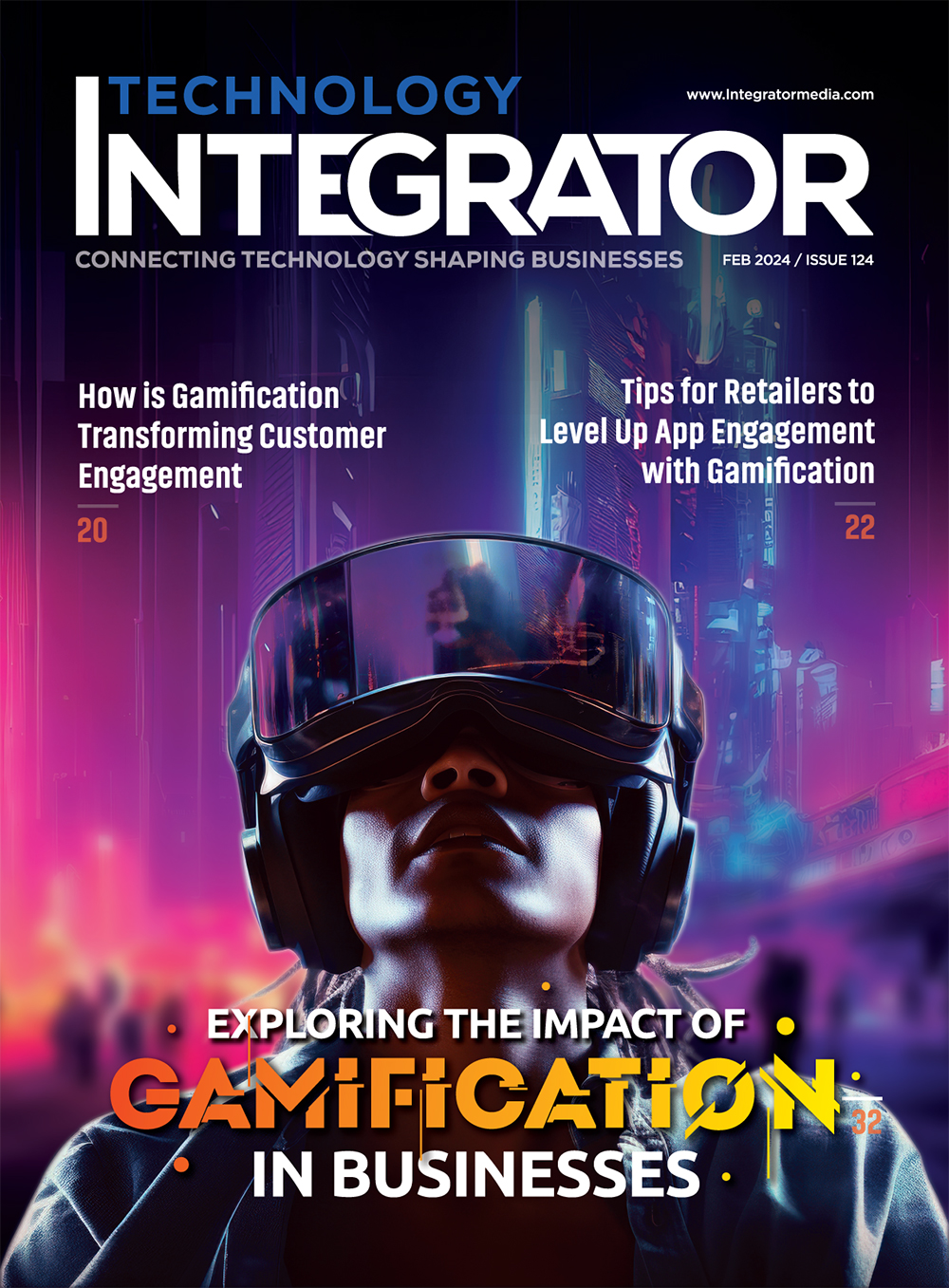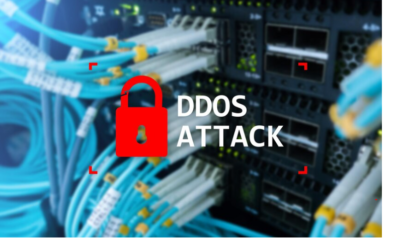Cover Story
Digital Silk Road: Dubai Disrupts Global Trade With Blockchain Technology

Dubai Chamber of Commerce and Industry (DCCI) is a public non-profit organization that promotes Dubai as an international business hub. DCCI forefronts the blockchain movements in the United Arab Emirates (UAE) with substantial initiatives. Yazeed Salah, Senior Manager – Chamber Executive Office at Dubai Chambers interacts with Murali Margassery, Assistant Editor at The Integrator on its ongoing efforts.
We understand that Dubai Chambers spearheads the adoption of the blockchain revolution in the country. Kindly elaborate on the ongoing efforts and recent initiatives.
As Dubai’s largest economic development arm, Dubai Chambers is playing an active role in supporting the Dubai Blockchain Strategy.
Well before the COVID-19 pandemic disrupted the business world, we were exploring and adopting cutting-edge solutions powered by blockchain and other advanced technologies to streamline our services to our customers, facilitate trade processes, improve ease of doing business and enhance Dubai’s economic competitiveness.
Digital transformation is a key focus of Dubai Chambers’ 2022-2024 strategy and we are working closely with strategic partners in the public and private sectors to spearhead innovative initiatives and programs that create added value for businesses in Dubai and expand their access to growth opportunities at home and abroad.
One of our biggest initiatives in the pipeline is Digital Silk Road, a platform that facilitates Dubai’s trade with the world. The platform is designed to simplify the import/export process by enabling users to track trade transactions, reduce transaction time and enable digital authentication in an encrypted, secure and cost-effective manner.
This mega project, aligned with Dubai 10X and designed to drive disruptive change among government entities and place Dubai 10 years ahead of leading global cities, is the result of several years of collaboration between Dubai Chambers and strategic government and private sector entities in the UAE and abroad. Following in-depth research into existing systems, we worked with leading banks, licensing authorities, free zones, port operators, and other industry stakeholders to develop a game-changing digital platform that will drastically improve and simplify trade processes and procedures.
The Digital Silk Road has the potential to reshape the global trading system as it will connect with similar digital trade platforms covering other markets around the world. Ultimately, it will elevate Dubai’s position as a business hub in the global arena and fast-track the emirate’s progress toward achieving its 5-year foreign trade target of $545 billion.
How successful is Dubai Chambers in receiving international attention for its initiatives?
Since Dubai Chambers was restructured last year into three chambers – namely Dubai Chamber of Commerce, Dubai International Chamber, and Dubai Chamber of Digital Economy, the organization has expanded its efforts to promote Dubai as a preferred business hub and attract multinational companies, startups, and scaleups from around the world. Earlier this year, Dubai Chambers launched the Dubai Global mega initiative that leverages a network of international offices and public and private sector partners to assist companies with their entry into the Dubai market.
As Dubai continues to open up its economy and introduce new incentives and advantages, we are increasingly seeing a surge in inquiries from investors and businesspeople from around the world who are keen to explore business opportunities in the emirate and leverage its strategic geographic position to expand its global reach.
Do you think the adoption of blockchain technology eliminates vulnerabilities in the global trading system?
Trade is one of the key sectors where blockchain is expected to create major business benefits and impact. By creating a digital record in real-time, blockchain technology has proven to be extremely valuable for global supply chains associated with international trade. For example, blockchain seamlessly facilitates transactions made between exporters and importers using a trusted system that doesn’t involve a third party.
Trade sector stakeholders are using blockchain to build trust, and make trade systems more efficient, secure, agile, and able to deal with future challenges. This is a positive for traders, governments, and citizens as such platforms become the go-to channels to drive revenue and boost trade.
Looking at other blockchain-based trade portals that are already up and running such as Singapore’s Networked Trade Platform and the Open Trade Blockchain, we are encouraged to see promising results such as increased trade volumes and enhanced efficiency and security of trade transactions. The future potential of these systems is tremendous, especially given the fact that they are linking China and Belt and Road countries digitally in a brand new and innovative way.
We believe that Dubai’s Digital Silk Road can do all of that and more as the emirate has everything it needs to digitize its trade system and connect it with its global counterparts, such as advanced IT and logistics infrastructure, thriving innovative business eco-system, strategic geographic position connecting markets across Eurasia, Africa, and the Middle East, as well as strong confidence among global businesses and investors.
Which are the top enterprises (public or private) and entities supporting Dubai’s blockchain ambitions?
There has been a lot of movement from both public and private sector players to support Dubai’s strategic ambitions to become a global innovation hub and knowledge-based economy. Government entities across the emirate have adopted blockchain solutions as part of their efforts to digitize services and this has enabled the emirate to achieve its vision of becoming 100% paperless.
Several leading cryptocurrency firms have relocated their operations to Dubai in recent years. This trend is a testament to the growing confidence in Dubai as a digital economy hub that fosters innovation and provides an ideal environment where blockchain companies can set up a base, thrive, and grow.
Despite such progress, the government of Dubai continues to raise the bar and set out new targets as it strives to build a thriving digital economy and position the city as one of the Silicon Valleys of the world. Recently unveiled, the Dubai Metaverse Strategy aims to attract more than 1,000 blockchain and metaverse companies to the city, in addition to creating more than 40,000 virtual jobs by 2030.
Does Dubai Chambers facilitate talks between UAE and other countries for collaborations based on these emerging technologies?
International cooperation is a key area of focus for Dubai Chambers and the three chambers operating under its umbrella. We are leveraging global exhibitions such as GITEX GLOBAL 2022 to provide a platform for innovative startups and digital companies from other markets to showcase their solutions, collaborate, and connect with potential business partners and investors.
To add to that, through Dubai International Chamber and the Dubai Global initiative, we are working to expand economic cooperation between business communities in Dubai and abroad across new emerging sectors and fields such as AI, blockchain, Web3, and the metaverse, fintech, and health-tech, among others. New roadshows, events, programs, and initiatives have been launched to create such collaboration opportunities and attract high-tech companies and startups to Dubai that can support the emirate’s innovation agenda.
Cover Story
Exploring the Impact of Gamification in Businesses

The Integrator recently interviewed Jeremy Density, co-founder and managing partner at Imagin3 Studio, an innovation advisory firm specializing in driving digital innovation across various sectors such as Web3, NFTs, Community, the Metaverse, and Artificial Intelligence.
Jeremy, who co-authored the book “Virtual Economy” with Dado Van Peteghem, discussed the potential developments of the next decade while grounding them in present realities. In the following questions, we explore the concept of gamification and its potential applications across different industries in the region.
Explain to our readers what the gamification of business entails, including its various applications across industries?
Gamification traces its roots back to the gaming industry, which has experienced remarkable growth over the past two decades. It’s intriguing to observe how individuals across different age groups, from children to adults, immerse themselves in gaming for hours, drawn by the engagement and interaction it offers. This phenomenon is attributed to gamification, which enhances engagement, interaction, and loyalty among players. Consequently, there’s immense potential for businesses to leverage these techniques to foster better customer engagement, an aspect many brands currently struggle with.
Gaming is one of the most successful and fastest-growing industries with a report suggesting that young Americans spend 12 hours a week gaming. For example, Roblox boasts 70.2 million active daily users who spend on average two and a half hours per day on the platform, which shows how gaming has evolved from a hobby to a way of living, connecting, and consuming.
Those new generations of customers are getting accustomed to fast-paced, increasingly engaging, and rewarding experiences, which is what they expect from the brands they consume. In our book, The Virtual Economy, we talk about the Magic Triangle and how brands must create value by focusing on building better EXPERIENCES, LOYALTY, and COMMUNITIES. This is exactly what games are about.
How can customers interact better with brands?
The biggest impact of gamification for brands lies in the ability to nurture more loyal customers. Loyalty programs have historically rewarded customers transactionally, based on their referrals or a set number of purchases.
A great example of a brand leveraging gamification techniques to grow a loyal fan base is Starbucks. Starbucks introduced a sophisticated points-based and benefits system through its Starbucks Rewards app, akin to some of the most successful Triple-A games. This digital alternative surpasses traditional loyalty cards, fostering customer loyalty and contributing significantly to the company’s revenue.
As a result of their successful loyalty program shift, Starbucks reported a $2.65 billion revenue increase, with over 25% growth in membership, and 40% of sales at US stores attributed to the membership program.
Starbucks leverages this approach to enhance customer interaction and feedback collection, offering incentives for completing surveys. This gamified strategy not only entertains users but also provides valuable insights to enhance overall business operations.
Going even further, Starbucks introduced Starbucks Odyssey in late 2022. This new layer of the loyalty program offers members the chance to participate in Starbucks “journeys”, such as watching a video on the history of the brand or trying their limited-edition Christmas drink, and rewards participants with “digital stamps”. Those stamps are either redeemable for unique benefits -one of them a trip to Costa Rica to visit a coffee farm, or tradable with other members on a marketplace. More than $200,000 of sales have occurred on the marketplace between members, with Starbucks grabbing a 7.5% royalty fee, making Starbucks Odyssey one of the first “loyalty-to-earn” programs, delivering direct benefits to members, and the brand.
This innovative approach not only enhances user engagement, loyalty, and customer experience but also serves as a creative method of collecting and utilizing data for continual improvement.
However, gamification is not only limited to increasing customer engagement and building more brand loyalty but also to improving internal operations.
Why brands are introducing gamification into their business?
Engagement in the workplace has increasingly become a challenge for brands and companies. A recent Gallup survey showed that “active disengagement” from employees has risen each year since the 2020 Covid pandemic. Only 32% of respondents felt engaged in their work, and 18% felt actively disengaged.
This lack of engagement has significant consequences for companies, whether through a lack of productivity or through increased recruitment and training costs derived from a higher employee turnover rate. Gamification could be seen as an appropriate solution to solve this problem.
It appeals to our competitive nature and fosters deeper engagement. Gamification integrated into business practices introduces a competitive and fun aspect that motivates professionals to outperform colleagues or their competitors within their industry.
As an example, gamification can be used to create more effective employee training programs. Training programs are loaded with information that usually takes a while to be completely acquainted with.
Companies can learn from popular Triple-A games such as Call of Duty and develop a leaderboard and badge system that encourages employees to finish modules and learn new skills that will benefit them. In other words, allow them the ability to “level up” their stats, gain XP points, and be rewarded when they complete certain classes and certifications.
Aside from the retail sector, in which other industries do you envision the application of gamification techniques?
The application of gamification techniques extends to virtually every industry that interacts with customers. Whether it’s retail or any other sector offering products or services, there’s a universal need to enhance customer engagement and loyalty. Therefore, gamification is pertinent for both business-to-consumer (B2C) and business-to-business (B2B) enterprises seeking to bolster customer engagement through innovative loyalty programs and engagement strategies.
How do you anticipate the integration of in-car gaming experiences to influence both the automotive and gaming industries?
The prospect of in-car gaming experiences impacting both industries is intriguing. While it’s true that current in-car gaming experiences, like those in Tesla vehicles, offer entertainment during stationary moments, it may take several years before such features significantly influence the gaming industry. The automotive sector must address various challenges, particularly in self-driving technology, before we witness substantial impacts on gaming. However, once these challenges are overcome, in-car gaming could liberate countless hours spent commuting, potentially transforming how individuals engage with gaming and other activities while on the move.
Looking ahead, do you foresee car companies launching cars through gaming platforms, and how might this impact automobile enthusiasts?
Car manufacturers, much like luxury brands and retailers, recognize the importance of fostering emotional connections with customers, especially younger generations. They aim to avoid being perceived as mere commodities and instead seek to create meaningful engagements. Understanding that gaming platforms offer rich opportunities for emotional interaction; car companies are increasingly leveraging these platforms to connect with younger audiences and cultivate lasting brand loyalty.
How do you envision the future of gamification in both the workplace and consumer-brand interactions, considering the influence of Generation Alpha and emerging technologies like VR and AR?
Gamification draws heavily from the principles of Prospect Theory, a behavioral economic concept highlighting the motivational power of small incentives in situations with known probabilities of outcomes. Individuals, fundamentally motivated by the prospect of rewards, find their behaviors influenced by gamification elements, offering brands a cost-effective tool to shape consumer engagement and commitment.
Beyond Gen Z, Generation Alpha is the only generation born into the internet and gamified experiences. Growing up playing games such as Roblox and Minecraft that leverage reward systems, Generation Alpha anticipates a similar dynamic in the workplace, emphasizing gamification’s lasting impact and relevance.
With the latest technological advancements, such as VR and AR, gaining popularity in workspaces with a generally young workforce, gamification will continue to shape companies and allow customers to connect with brands at a more relatable level.
Cover Story
Exploring Seagate’s Innovative Drive and Market Strategies

Seagate Technology specializes in designing, manufacturing, and marketing of hard disk drives tailored for a range of applications, including enterprise and client computer usage, personal data backup systems, portable external storage, and digital media systems.
In the light of approaching Intersec 24, the Integrator had an exclusive Interview with Mr. Mohit Pandey, Head of Sales – META, Seagate Technology, addressing industry challenges, providing key insights on market segmentation, technological prowess, and their electronic data storage solutions.
What can we expect from Seagate at Intersec 24?
At Intersec Dubai 24, visitors to our booth will witness the latest products and technologies expected to hit the market in the near future. We are eager to onboard resellers and installers for our partner program and engage in meaningful discussions about our unique services and solutions.
Seagate’s EMEA Management team, including Maarten Guijt (Vice President, EMEA Channel, Consumer and Distribution Business), Vincent Oostlander (Director, Seagate Systems and Lyve Solutions, EMEA), and Mohit Pandey (Head of Sales, META), along with Country Managers and Marketing & PR leads, will be physically present at the event to assist current and potential customers.
How is Seagate ensuring it has industry-leading solutions for today’s demanding and secure use cases?
Securing mission-critical data in the most advanced way is Seagate’s primary objective. Our guiding principles of innovation, integrity, and inclusion have positioned us as a leader in data management in today’s complex IT world.
Our extensive portfolio caters to various sectors, including consumers, the surveillance industry, gamers, network-attached storage users, cloud service providers, flash users, NVMe users, and unified storage users.
Surveillance Industry – Data that gets generated through Artificial Intelligence (AI) enabled cameras and Internet of Things (IoT) edge points, Seagate provides Skyhawk and Skyhawk AI HDDs for Network Video Recorders and Direct Video Recorders to ensure not a single frame of video is lost, and the customer stores data in the most secured yet cost-effective way.
Cloud Service Providers – CSPs are driven by solutions that are scalable, responsive, and innovative. Seagate Exos provides the most innovative and futuristic Nearline HDDs for customers looking for high throughput and massively dense storage capacity. With our Heat Assisted Magnetic Recording Technology, together with Multiple Actuator 2.0, we are the answer to the industry’s mission-critical workloads, for Cloud, IoT, and AI. Creating a data pool for high-performance computing is now affordable and not a distant dream for organizations.
Enterprise Mission Critical Drives – Enterprises, day by day are working on complex virtualized use cases that demand application throughput to enhance speed and agility. Seagate offers customers worldwide its ultra-agile SSD and NVME solutions known as Nytro. With cutting-edge technology and data protection, corporations have peace of mind when accessing mission-critical and high throughput use cases.
Consumers with personal storage demand – Seagate provides solutions like Expansion, One Touch Hubs, and SSD solutions for storing consumer’s data in the most data-protected environment.
Gaming Industry – If someone calls the gaming industry a niche, then this niche industry has been surpassing the billion dollars for the past years and its incremental growth is a testament that this industry is growing by leaps and bounds. Seagate with its incredible FireCuda brand offers unmatched gaming experience for the users by providing HDDs, SSDs, and NVMEs for this performance demanding market. To top that, we have driven designed as per the game. E.g., Call of Duty, we have a specialized drive designed for Call of Duty, so on and so forth.
How do you define market segmentation?
SMEs and SMBs – SME and SMB constitute 60% of the corporate entry-level IT use cases. Even if the size of the organization is medium, their IT challenges and ambitions are not. The ever-increasing and growing IT management requires very demanding and secure data management. Seagate with its Network Attached Storage HDDs and SSDs (IronWolf, IronWolf Pro, and IronWolf SSD) proposes superior and industry-leading NAS HDDs and SSDs for customers whose requirements are growing and demanding secured drives with unmatched throughput.
Large Corporates – With Seagate Data Storage System (Unified Storage), Seagate provides Hybrid Flash Arrays (HFA), All Flash Arrays (AFA), and the most densely populated Storage available on earth (Corvault). Imagine 2.5PB of RAW Capacity in a 4U enclosure. That’s unbelievable, right? I will say that’s new age technological superiority and that’s Seagate. Use cases such as virtualization, data backup and recovery, high-performance computing, on-premises and hybrid cloud set up, media editing and hosting, video surveillance and analysis, mission-critical applications get the most thriving data management solution for secured data.
Vloggers, YouTubers, and Resellers (Consumer – Retail) – Seagate has a special product for prosumers (professional consumers) and provides the most rugged yet stylish HDDs and SSDs for consumers who have no limit to their creative imagination and world-class content. Supported heavily by Apple, Seagate’s LaCie drives create magical data management and solution for creative data. Whatever the need of the data, whether it is structured data or unstructured data or a combination of both, LaCie provides the most impeccable solution to prosumers globally.
What is Seagate’s edge on technology alliance?
Seagate has years of experience in monetizing world-class data management for mission-critical use cases based on Artificial Intelligence, cloud network operations Center, Internet of Things, high-performance computing, virtualization, data backup and recovery, data imaging, media content editing, and hosting. Seagate does all that by constantly investing a major sum of its income in research and development. Some of the examples are mentioned below as follows: Thus, with massive solutions, market-leading areal density, tested and aligned development with technological alliance partners on futuristic and secured technology, Seagate is poised for a bright and committed data management solution for the customers and consumers of Datasphere.
Which markets does Seagate prioritize in CY 24?
One of the largest markets in the Middle East, which is actively pursuing digital transformation is the Kingdom of Saudi Arabia actively working to roll-out the latest advanced technologies and Smart City developments. In fact, the Kingdom was named the “Top Digital Riser” among the G20 nations in 2021 due to the comprehensive government support for digital transformation in the Kingdom as part of Vision 2030. As a global leader in mass-data storage solutions, Seagate is actively investing in KSA. To support its ambitions as a leading tech hub, affordable, flexible, scalable, and secure high-performance data management systems will be vital. With more than 40 years of experience in cutting-edge technologies and solutions, we are equipped with the skills, expertise, and technology to support Saudi Arabia’s advanced IT infrastructure needs. In line with Saudi Vision 2030, the National Transformation Program, growth of the non-oil sector and a fast-growing population, the market for surveillance and video analytics in the Kingdom of Saudi Arabia is expected to grow at a CAGR of 3.7% between 2020-2026. Within the segment, the camera component acquired the highest revenue share, and the most popular vertical for the market proved to be government and transportation, as remote monitoring, transportation management and increased public safety are priorities among the authorities. At the same time, looking to the future, surveillance and video analytics are expected to play a major role in the development of smart cities. They will also be critical as Saudi Arabia’s major infrastructure projects are advanced.
Cover Story
Businesses Going Digital and Embracing Sustainability with Pagero

In an exclusive interview with the Integrator, Pagero’s Chief Product Officer, Gustav Dahllöf, discusses their mission to become the world’s largest open business network, simplifying the buying and selling process. They are revolutionizing invoicing processes with innovative solutions, boosting operational efficiency, and cost savings. Moreover, Pagero is leading the way to a paperless, greener, and more sustainable business world!
How does Pagero help companies go digital, and what are your offerings?
The core concept of Pagero is to make buying and selling easier. Digitalisation trends are changing the way companies and consumers want to do business, with expectations growing every day in terms of efficiency and reliability. That is why we have designed Pagero to be a cloud-first, open business network where buyers and suppliers can exchange business documents such as invoices, orders, and confirmations, in compliance with regulations set by the tax authorities in the 140+ countries where our clients do business.
At Pagero, we provide a comprehensive range of solutions that align with current industry requirements. One of our main offerings is our e-Invoicing solution, empowering organizations to streamline their invoicing processes, enhance operational efficiency, and achieve cost savings. Furthermore, we have solutions that expand these digitalization efforts towards the full Purchase-to-Pay and Order-to-Cash processes. In addition, we offer a wide range of value-added services, including e-archiving, e-payment, business intelligence, validation, and enrichment services. Our ultimate goal is to establish ourselves as the world’s largest smart, open business network – making buying and selling easy!
Tell me about Pagero’s e-invoicing platform and how does it streamline invoicing and improves efficiency.
Pagero’s e-invoicing platform is a cutting-edge digital solution designed to optimize and simplify the invoicing process for businesses. By enabling seamless electronic transmission of invoices between suppliers and buyers, the platform eliminates the need for manual paper-based invoicing, reducing processing time and errors significantly.
The key advantages for businesses in adopting e-invoicing include:
- Enhanced accuracy and data integrity
- Faster invoice delivery
- Reduced administrative costs
With streamlined invoicing procedures, businesses can experience improved cash flow due to faster payment cycles and reduced payment delays, ultimately fostering better relationships with trading partners.
How does Pagero promote environmentally friendly business practices beyond e-invoicing? What initiatives have you taken to provide a sustainable business ecosystem?
Beyond our core e-invoicing services, we actively promote and support environmentally friendly business practices through several initiatives and features aimed at reducing environmental impact. Our commitment to paperless document management encourages companies to transition to digital solutions, saving trees and reducing carbon emissions linked to paper production and transportation.
Additionally, we provide an environmental dashboard free of charge to all customers, allowing them to track the environmental savings achieved by switching from paper to electronic processes. Our dedication lies in creating a greener and more sustainable business world!
How does Pagero’s platform accommodate businesses of different sizes and industries?
Our platform is designed to offer seamless scalability and integration, making it suitable for businesses of varying sizes and industries. Its flexible architecture allows it to handle both small businesses with limited transaction volumes and large enterprises processing a high volume of transactions. For small businesses, Pagero provides a straightforward onboarding process and user-friendly interfaces that require minimal technical expertise.
As companies grow, Pagero’s platform can effortlessly accommodate increased transaction volumes and more complex workflows without compromising on performance or efficiency. Moreover, Pagero’s integration capabilities enable it to seamlessly connect with various enterprise resource planning (ERP) systems, financial software, and other essential business tools, ensuring smooth data exchange and reducing manual intervention.
 How does Pagero ensure compliance and legal certainty on their platform, and what steps are taken to minimize the risk of non-compliance?
How does Pagero ensure compliance and legal certainty on their platform, and what steps are taken to minimize the risk of non-compliance?
Our platform is designed with security and data protection in mind, employing encryption and authentication protocols to safeguard sensitive information. Pagero conducts regular audits and assessments, both internally and by third-party experts, to ensure adherence to compliance standards. To minimize the risk of non-compliance, we implement strict internal controls and governance frameworks. Additionally, Pagero provides comprehensive training and support to our users, ensuring they understand and follow compliance guidelines.
How does Pagero’s reporting and analytics tools help companies optimize workflows and make informed decisions with improved data visibility??
Pagero’s reporting and analytics platform play a crucial role in enhancing data visibility for companies. By providing comprehensive insights and real-time data analysis, these tools enable businesses to gain a deep understanding of their operations, identify trends, and pinpoint potential inefficiencies. Leveraging this information, companies can optimize their workflows by streamlining processes, automating repetitive tasks, and improving collaboration among teams and partners. Furthermore, the data-driven insights facilitate informed decision-making, allowing organizations to make strategic choices based on accurate, up-to-date information. This leads to improved productivity, cost-effectiveness, and overall performance, ultimately fostering a competitive advantage in the market and driving business growth.
What are Pagero’s plans for expansion and partnerships in 2023 and beyond?
We have certain exciting plans for significant expansion and strategic partnerships in response to the rapidly evolving global landscape. With the increasing adoption of e-invoice mandates across the GCC and the world, and the growing trend of digitalizing business processes, Pagero is positioned to lead the way in this transformation. Through strategic partnerships, we aim to enhance our technological capabilities and broaden our reach. Our goal is to build the world’s largest open business network, empowering businesses with innovative solutions that can facilitate seamless digital transactions and drive economic growth.
-

 Tech Interviews2 months ago
Tech Interviews2 months agoNavigating the Cybersecurity Landscape in Hybrid Work Environments
-

 Tech Features3 months ago
Tech Features3 months agoHow Telecommunications Providers Can Best Tackle DDoS Attacks
-

 Tech News4 months ago
Tech News4 months agoGoogle Appoints Ziad Jammal as Google Cloud Country Manager in the United Arab Emirates
-

 Tech News5 months ago
Tech News5 months agoSenet enters MENA’s Competitive Gaming Scene with ‘skill-to-earn’ Platform
-

 Automotive2 months ago
Automotive2 months agoAl-Futtaim Automotive Builds On 23-Year Legacy of Trust & Leadership in UAE’s Pre-Owned Car Market to Sell Over 25,000 Used Vehicles in 2023
-

 Tech News2 months ago
Tech News2 months agoBrighton College Abu Dhabi and Brighton College Al Ain Donate 954 IT Devices in Support of ‘Donate Your Own Device’ Campaign
-

 Events3 months ago
Events3 months agoIntegrator Media Successfully Hosts the Corporate SME Open 2024, Revolutionizing Networking in the SME Sector
-

 News7 months ago
News7 months agoSurveySparrow Expands Footprint in MENA Region with Regional Office and State-of-the-art Data Center













